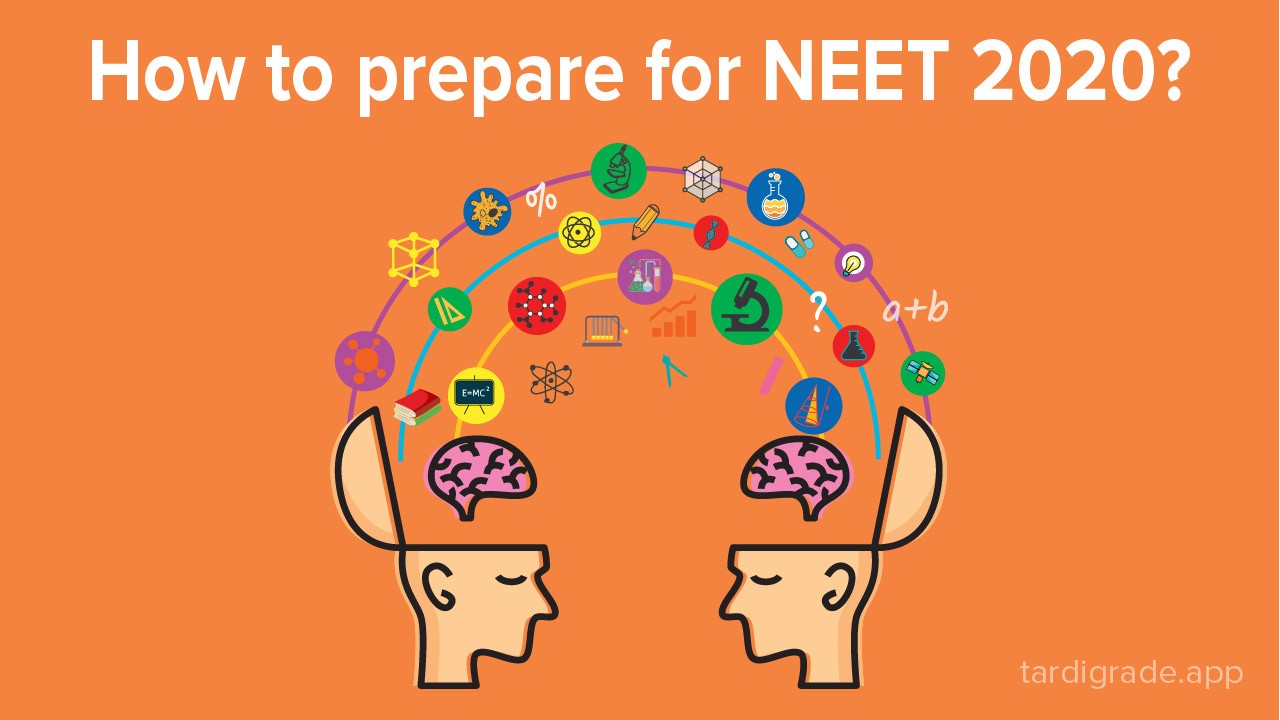
How to prepare for NEET 2020?

NEET – Highly Competitive and Widely Sought. It is the pathway to every medical aspirant in India who dreams of becoming a Doctor. Known as the gateway for MBBS and BDS course, NEET is a National level exam conducted every year. It replaced AIPMT in the year 2016 and is conducted by NTA (from the year 2019). Every year the number of students attempting the exam is increasing and as of now more than 12 lakh students appear for the exam, of which 6 - 7 lakh students qualify. There’s stiff competition to secure a seat and to sail through this big sea called NEET, an effective approach and strong strategy is something that is very much in need to reach this goal. Keep reading for the best preparation tips to crack NEET2020.

- Effective Plan with Proper Goal – First and foremost thing to do is to discipline your mind towards achieving your goal. Condition your mind and set the goal to score 650+ marks in NEET (720 is the total marks). And a score of 650+ will fetch you better ranking for sure. Plan what to study when. Make priorities by allotting more time to complex topics. Remember it’s never about how long you study but how well you study.
It is known that each chapter in each subject has a certain weightage and the chapter having more weightage is the one from which more number of questions are asked. - Realistic Timetable – Be true to yourself and make a timetable that suits you. Be realistic. Dedicate a minimum of 6 hours for studies when your concentration is at peak. And once you prepare your timetable, stick to it and be consistent in your learning. Keep your priorities in mind.
- Sequence of learning – Start your preparation from scratch. Let your basics be strong. Determine What, When and How to study. Don’t jump between topics, instead learn sequentially. There’s always a connection between topics, identify them. Study with utmost focus by reserving equal time for all subjects. Let Biology be your priority subject but focus on Physics and Chemistry equally. Maintain consistency.
- Let Syllabus be your guiding light – Know your syllabus by heart. Around 70-80 percent of questions asked in the NEET examination are based on the concepts you learn in 11th and 12th standard. The best book for syllabus wise learning is NCERT books, which covers all the concepts required for the exam. Apart from NCERT, there are other books which are given below. It can also be referred. Select the books which gives you a good understanding of the subject and read them more.
Some book for your reference
Physics-
Name of Book Authors Name Concepts of Physics H.C. Verma Objective Physics D.C. Pandey Fundamentals of Physics Halliday, Resnick and Walker Chemistry-
Name of Book Authors Name Physical Chemistry, Organic Chemistry and Inorganic Chemistry O.P. Tandon Dinesh Chemistry Dinesh Modern’s ABC of Chemistry for class 11th and 12th Dr. SP jauhar Biology-
Name of Book Authors Name Elementary Biology Volume 1 & 2 Trueman Objective Biology Dinesh MTG’s Objective NCERT at your fingertips MTG - Time management – The key for effective preparation lies in managing the time well. Both in during studying and writing the examination, time management and speed plays a crucial role. Allot more time for difficult concepts and study them first during your learning phase whereas attempt the easy questions first while attempting the exam.
- Practice and Learn – Be regular with your practice and be creative with your learning. Learn the same concept in different ways. For example read a concept in a text book, understand it, next see a video lecture/class lecture of the same concept. This way the concepts gets imprinted on your mind. Be persistent. Solve previous year question paper as much as possible – to get an idea on how questions are asked, the pattern of questions being asked from a given topic and how many times a question or topic is repeated. It gives you an overall idea. Also, solving papers helps you assess yourself. Study conceptually. Understand the concepts. d understand.
- Note where you fail – To err is to human. Don’t be hard on yourself for the mistakes done. Instead write it down and work on it slowly. The next time you encounter the same problem make sure you don’t repeat the same mistake. Never give up. There might be topics or concepts which you forget again and again, make a note of those topics and work on them during your revision time.
- Write, Revise, Repeat – Practice and Revision goes hand in hand. Make notes using different sources and revise them regularly. Set aside some time for it every day. Test yourself on weekly basis by preparing a test on what you have learnt so far. Once in a while try to think like a examiner and prepare questions which are tricky, simple and complex. Next work on solving/answering them. Repeat the process.
- Tips and Tricks – Just reading over and over can be boring. Making learning fun. Try simplifying the concepts. Compress the information. Break a complex information into smaller parts for a easier read.
- Colour code: Colour code your notes. i.e., use a colour to highlight examples, one more to formulas and so on (but don’t use more colours). Example: Green colour for examples, blue for formulae, red of important points and so on.
- Mind maps: It is nothing but a visual map based on your ideas. Create your own mind maps around a central concept and organise your notes around this concept.
Examples
Nervous System

Central Nervous System

- Mnemonics: Make use of Mnemonics which makes studying fun without being burdensome. Some of mnemonics for you are listed below
Types of vaccines:
"STARK" -
Subunit,Toxoid,Attenuated (live), Recombinant, Killed (inactivated)Functions of Adrenal Gland:
"ACTH" -
Adrenergic functions, Catabolism of proteins/Carbohydrate metabolism, T cell immunomodulation, Hyper/Hypo tension(blood pressure control).These are just examples, you can make your own mnemonics.
- Go online – Yes, you read it right. Create an online study group with your friends to discuss about subjects. Make use of online lectures, download question papers and solve it. Take Mock tests. Make use of analytics available to evaluate your performance. Keep yourself updated on exam related news. All these don’t necessarily require money. There are ample of free and quality resources available online for free. If you can’t buy textbooks/reference books, find a free version of the same in PDF. Make use of internet in a productive way.
- Healthy body and Steady mind – Maintain a healthy lifestyle. Keep yourself hydrated. Eat Veggies. Include colourful vegetables and fruits as your every day diet. Avoid fried, junk and oily food. Go for everything fresh. Exercise daily. A healthy body paves way for healthy mind. Dedicate a few minutes for meditation. And sleep well. Never neglect it. Don’t stress yourself when you don’t get a concept, just breathe and let it go. Try to read the same concept after some time.
- Discuss and Share – With good discussions, good ideas gets exchanged. Discuss subjects, methods of learning among your friends and share knowledge and tips. Explain the concepts in simple terms to your friends, or family members or anyone who has a patient ear, if you succeed in making them understand, then you have climbed a step in mastering the concept. Give yourself a pat.
NEET is a competitive exam but it is not impossible to crack. Be sincere in your efforts. It will definitely bring you the success you very much deserve. Have a good attitude towards your goal. Don’t get depressed if you make mistakes or if you don’t understand a concept. Just keep studying. Be confident. As the saying goes – positive action with positive thinking results in success.
All the best!






